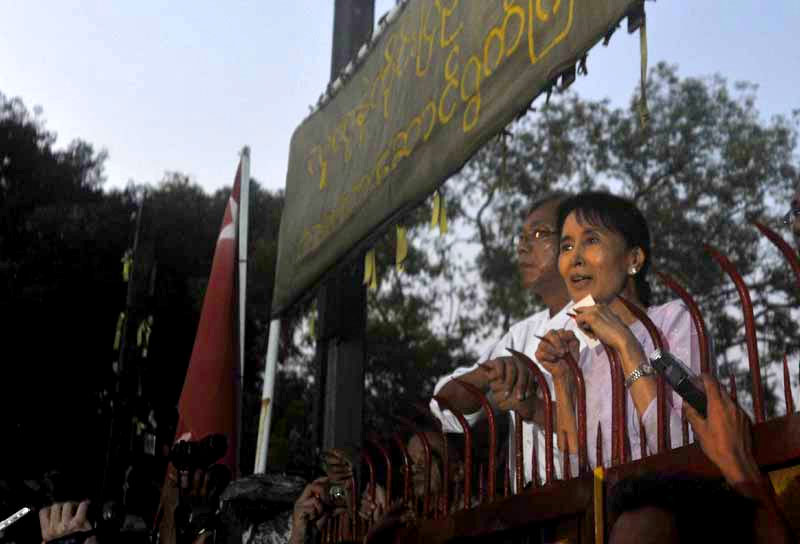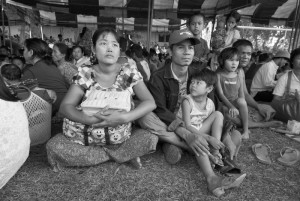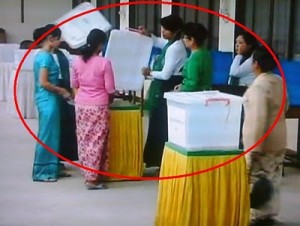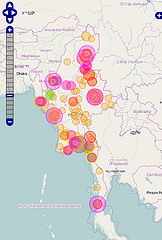Posts Tagged ‘Burma Election Tracker’ (8 found)
Fraudulent Elections Undermine Citizen’s Electoral Rights
“There was intimidation and forced voting. People in the villages also said they were given presents and money. The Union Solidarity and Development Party (USDP) told voters to vote for them at the polling station. The uneducated people were convinced by the USDP. We also realized that the USDP had many advance votes. The USDP conducted a census of elderly people and counted them all as advance votes. I do not think significant changes will occur after the election. This is just to change the name [of the government].”
– A voter from Irrawaddy Division
Burma’s elections took place in a highly undemocratic and repressive environment governed by a countrywide entrenched climate of fear. This environment, coupled with a lack of voter secrecy, ensured that the regime and its allied parties were able to easily carry out electoral fraud on a widespread and systematic basis. Through the manipulation of advance votes, tampering of voter lists, vote buying, and illegal campaigning, the USDP was able to comfortably secure an overwhelming victory, despite the complete lack of genuine public support.
• • •Elections Marred By Regime’s Campaign Restrictions, Harassment and Lack of Voter Education
“In my region, many people were not interested in the elections, and didn’t know anything about the elections. There was no electoral education and people who knew about elections were afraid of getting into trouble. I don’t think the elections will bring any betterment to people. I see the elections are designed for the military regime.”
During the elections, the regime took extensive measures to limit election participation at all levels; from restricting political party participation to blocking free flow of information on the elections, the State Peace and Development Council (SPDC) ensured that they would be able to dominate and control the process from beginning to end. Ethnic parties and ethnic voters were particularly marginalized and suppressed as the Election Commission rejected leading ethnic parties and candidates, security forces hassled ethnic parties, and ethnic voters received little to no electoral education. By limiting such participation, the regime effectively stifled opposition from political parties and the electorate on the day of the polls.[…]
• • •Abuses of Government Authority During Elections Highlight Un-Rule of Law in Burma
“Although we don’t like the USDP, all the villagers including me voted for the USDP since we were ordered by the town authorities to vote for the USDP. We were afraid while we were voting since the authorities were watching on us at the polling station, to see if were voting for them or not.”
– A voter in Shan State
Throughout the elections, the regime exercised gross abuses of authority in a widespread attempt to dominate and manipulate the elections to their advantage. From publically supporting the regime-backed Union Solidarity and Development Party (USDP), to employing the Union Election Commission to unlawfully influence voters, to forcing vast numbers of voters to support the USDP or face consequences such as fines, demotions, or arrests, the regime was involved in the elections at all levels. The Election Commission’s blatant favoritism highlights the way in which the elections have been structured to further the regime’s plans to entrench military rule. Certainly, the regime’s handpicked Election Commission and undemocratic election laws are indicative of the severe lack of rule of law in Burma – where laws are structured to be used against the people, rather than to protect their rights […]
• • •Burma’s Elections Marked by Violence, Intimidation and Ethnic Inequality
Burma’s November elections took place in an environment marred by widespread violence and intimidation as the regime sought to exploit the pervasive climate of fear in Burma to ensure complete control over the electoral process. Intimidation and threats were carried out in the lead up to the elections, in order to ensure a lack of a viable political opposition and to guarantee ‘popular support’ for regime-backed parties. These threats proved to be largely successful, and when they were not, the regime often followed up the threats with repercussions. Such election related human rights violations took place across the country, but were noticeably worse in ethnic areas, highlighting the regime’s long-standing policy of ethnic discrimination and persecution. This disregard for ethnic rights has translated in heightened tension between ethnic communities and the central regime, and an associated risk of increased armed conflict in ethnic areas.[…]
• • •Democracy Leader Daw Aung San Suu Kyi Finally Free; Supporters Celebrate and Call for Guarantees of her Safety
 Today marked the end of Daw Aung San Suu Kyi’s most recent term of seven years under house arrest as Burma’s military regime finally released the democracy leader upon the expiration of her sentence. Thousands of National League for Democracy (NLD) members and her supporters gathered outside of her house to catch a glimpse of their beloved leader on this historic day. The crowd cheered elatedly as she emerged from her house. People wept for joy, danced and celebrated to long awaited release of the democracy leader. “We must work together in unison to achieve our goal,” she said, reiterating her timeless commitment to unity and peace.
Today marked the end of Daw Aung San Suu Kyi’s most recent term of seven years under house arrest as Burma’s military regime finally released the democracy leader upon the expiration of her sentence. Thousands of National League for Democracy (NLD) members and her supporters gathered outside of her house to catch a glimpse of their beloved leader on this historic day. The crowd cheered elatedly as she emerged from her house. People wept for joy, danced and celebrated to long awaited release of the democracy leader. “We must work together in unison to achieve our goal,” she said, reiterating her timeless commitment to unity and peace.
Neither Free Nor Fair: Burma’s Predetermined Elections
 Burma’s elections yesterday were marked by fraudulent activities, a notably low voter turnout, and an overall skepticism that these polls would bring any real change to people’s lives. Despite crippling media restrictions and a ban on international election monitors in Burma, over the course of the last two days there has been substantial and mounting evidence of significant elections-related violations emerging from the country. While these violations undermine the credibility of the elections, they have not been unexpected based on the pre-election conditions. Long before election day, it was evident that the military regime had failed to create the necessary conditions for these elections to accurately represent the will of the people […]
Burma’s elections yesterday were marked by fraudulent activities, a notably low voter turnout, and an overall skepticism that these polls would bring any real change to people’s lives. Despite crippling media restrictions and a ban on international election monitors in Burma, over the course of the last two days there has been substantial and mounting evidence of significant elections-related violations emerging from the country. While these violations undermine the credibility of the elections, they have not been unexpected based on the pre-election conditions. Long before election day, it was evident that the military regime had failed to create the necessary conditions for these elections to accurately represent the will of the people […]
Burma’s Election Day Marked by Fraud and Low Voter Turnout
 Despite crippling media restrictions and a ban on international election monitors in Burma, over the course of the day there has been substantial and mounting evidence of significant elections-related violations emerging from the country.
Despite crippling media restrictions and a ban on international election monitors in Burma, over the course of the day there has been substantial and mounting evidence of significant elections-related violations emerging from the country.
Violations reported by media, citizens inside Burma, and inside networks include accusations of ballot stuffing, unsecure ballot boxes, flawed voter lists, lack of secret voting processes, and illegal campaigning. Many voters were also told how to vote by polling station staff or had their ballots cast in their name . Members of the junta-backed Union Solidarity and Development Party (USDP) interfered in many polling stations, taking on roles and responsibilities prohibited in the election laws […]
Election Day Has Arrived: Burma Election Tracker Online!
 Today, on the day of elections, we invite you to join us in tracking the elections through personal interviews, media articles and citizen reports documented on the website. Together, we can follow the elections, and see the developments as they occur over the next few weeks.
Today, on the day of elections, we invite you to join us in tracking the elections through personal interviews, media articles and citizen reports documented on the website. Together, we can follow the elections, and see the developments as they occur over the next few weeks.
The information gathered on this site is a testament to the will of the Burma’s democracy and human rights activist networks inside and outside the country – given the military’s draconian restrictions on reporting and freedom of speech, what is remarkable is the fact that these personal stories have even been able to make its way out of the country. The reports are thanks to a vast network of media reporters, activists, citizens in Burma, migrants, and Burma’s diaspora […]









 All posts
All posts